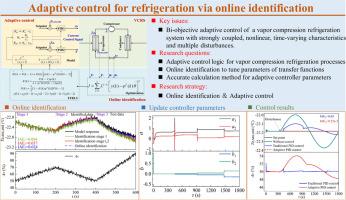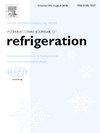通过在线识别实现制冷自适应控制
IF 3.5
2区 工程技术
Q1 ENGINEERING, MECHANICAL
International Journal of Refrigeration-revue Internationale Du Froid
Pub Date : 2024-10-11
DOI:10.1016/j.ijrefrig.2024.10.004
引用次数: 0
摘要
蒸汽压缩制冷系统(VCRS)在现代社会和热科学领域占据着重要地位。然而,蒸汽压缩制冷系统的运行受到外部干扰(动态变化的环境)和系统固有特性(耦合或非线性特征)的双重影响,导致制冷效率降低和制冷量大幅波动等问题。为了应对这些挑战,提高 VCRS 在动态变化环境中的适应性,本研究基于交换移动边界法建立了 VCRS 的动态模拟模型。研究了外部环境干扰对制冷性能的影响,并采用连续在线识别方法阐明了其内部耦合特性和非线性特征。利用开发的带有遗忘因子的递归最小二乘法进行在线识别,引入了自适应温度控制方法,实现了精确的模型识别,为自适应控制器的实时参数调整提供了便利。结果表明,与传统的 PID 控制器相比,在线识别和自适应控制算法的混合范例不仅能有效处理各种干扰,还能将过冲和 IAE 降低 2-3 个数量级。自适应 PID 控制将过冲保持在 10-4 数量级,IAE 保持在 10-5 数量级。本文章由计算机程序翻译,如有差异,请以英文原文为准。

Adaptive control for refrigeration via online identification
Vapor compression refrigeration systems (VCRS) occupy a crucial position in modern society and in the field of thermal sciences. However, the operation of VCRS is subjected to both external disturbances (dynamic-changing environment) and inherent system characteristics (coupling or nonlinear features), leading to issues like reduced refrigeration efficiency and significant fluctuations in cooling capacity. To address these challenges and enhance the adaptability of VCRS in dynamically changing environments, this study establishes a dynamic simulation model for VCRS based on the Switched Moving-Boundary method. The impact of external environmental disturbances on refrigeration performance is investigated, and continuous online identification methods are employed to elucidate its internal coupling characteristics and nonlinear features. The adaptive temperature control method is introduced, benefiting from the developed recursive least squares method with a forgetting factor for online identification, achieving precise model identification which facilities the real-time parameters tuning of adaptive controller. The results indicate that the hybrid paradigm of online identification and adaptive control algorithm not only effectively handles various disturbances but also reduces overshoot and IAE by 2–3 orders of magnitude compared to traditional PID controllers. Adaptive PID control maintains overshoot in the 10–4 order of magnitude and IAE in the 10–5 order of magnitude.
求助全文
通过发布文献求助,成功后即可免费获取论文全文。
去求助
来源期刊
CiteScore
7.30
自引率
12.80%
发文量
363
审稿时长
3.7 months
期刊介绍:
The International Journal of Refrigeration is published for the International Institute of Refrigeration (IIR) by Elsevier. It is essential reading for all those wishing to keep abreast of research and industrial news in refrigeration, air conditioning and associated fields. This is particularly important in these times of rapid introduction of alternative refrigerants and the emergence of new technology. The journal has published special issues on alternative refrigerants and novel topics in the field of boiling, condensation, heat pumps, food refrigeration, carbon dioxide, ammonia, hydrocarbons, magnetic refrigeration at room temperature, sorptive cooling, phase change materials and slurries, ejector technology, compressors, and solar cooling.
As well as original research papers the International Journal of Refrigeration also includes review articles, papers presented at IIR conferences, short reports and letters describing preliminary results and experimental details, and letters to the Editor on recent areas of discussion and controversy. Other features include forthcoming events, conference reports and book reviews.
Papers are published in either English or French with the IIR news section in both languages.

 求助内容:
求助内容: 应助结果提醒方式:
应助结果提醒方式:


